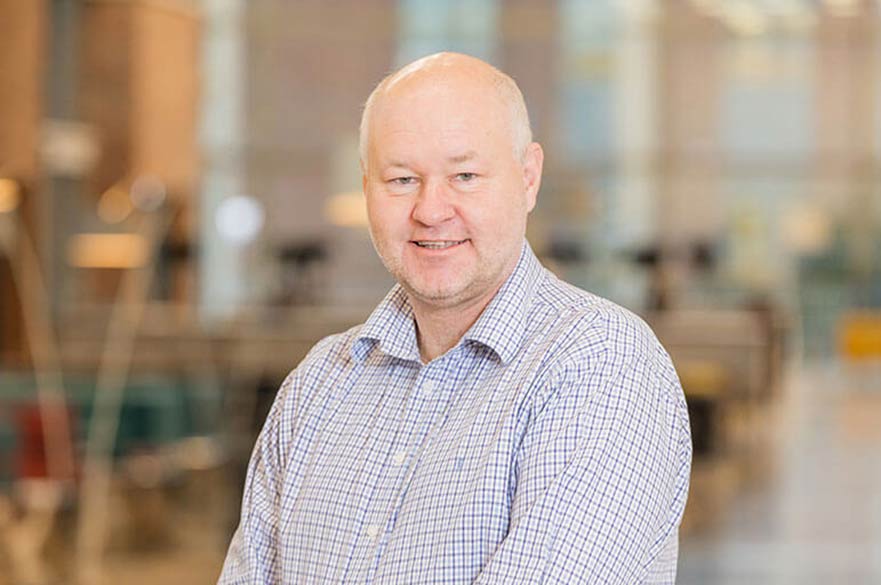Role
Dr Turner is Co-Lead for the NTU Research Theme: Diabetes, Chronic Diseases & Ageing. His research focuses on understanding the causes of diabetes and inflammatory diseases, and in identifying new therapeutic targets for drug development. He supervises undergraduate, postgraduate, and post-doctoral research projects in these areas. He is Module Leader on the MSc module, Biology of Disease (BIOL40013), and also teaches on the MSc module, Cell Culture and Antibody Technology (BIOL40031), along with the BSc modules Current Topics in Biochemistry (BIOL34013), and Molecular Genetics of Human Diseases (BIOL25013).
Career overview
After completing his PhD in Medicine at the University of Liverpool, Dr Turner moved to the USA to undertake postdoctoral studies at The Scripps Research Institute, Harvard Medical School, and Albert Einstein College of Medicine. He then returned to the UK to take up a faculty appointment at Bart's and The London School of Medicine and Dentistry, before later moving to his current position here at Nottingham Trent University.
Research areas
Research in the Turner laboratory focuses upon elucidating molecular causes of disease and in identifying new treatment options. Specific areas of research are as follows:
Diet and Diabetes
Elevated circulating glucose and fatty acid concentrations are known to trigger and exacerbate type 2 diabetes. Dr Turner’s group is interested in identifying those genes whose expression becomes dysregulated during diabetes development, thereby leading to impaired function of key cells and tissues regulating glucose homeostasis. Recent research from the Turner group utilising both Affymetrix microarray and Illumina HiSeq next generation sequencing has enabled us to identify thousands of pancreatic genes whose expression level changes following exposure to high levels of glucose and/or fatty acids. Using a combination of different state-of-the-art non-biased bioinformatic algorithms we have now identified multiple pathways and individual targets that form the basis for current and upcoming outputs and investigations.
Protein Adduction, and Protective Action of Reactive Species Scavenging, in Metabolic Diseases
Proteomic data has recently been acquired from pancreatic beta-cells, skeletal muscle, and serum, detailing advanced glycation and lipidation endproduct modification of proteins exposed to metabolic stress. Crucially, the naturally occurring dipeptide, carnosine, can prevent / reverse many of these damaging modifications, indicating potential therapeutic action of this molecule. However, carnosine turns over quickly in the body, so we are currently screening and characterising a number of slowly-hydrolysable analogs (that act as either carnosinase inhibitors or carnosine mimetics) which could potentially be developed as more powerful treatments for metabolic diseases, including diabetes, obesity, and cancer.
Identification and Manipulation of Novel Targets to Enhance Insulin Secretion
Existing diabetes therapies tend to become less effective over time, meaning that there is an urgent and currently unmet clinical need to develop new therapeutic strategies to enhance insulin secretion. Dr Turner’s group has identified a number of intracellular signalling pathways linked to insulin secretion which become dysregulated by glucose and fatty acids. Translational molecular strategies are being pursued that can modify activity of these pathways, with the aim of developing new therapeutic treatments based on these strategies.
Current opportunities exist to carry out postgraduate research towards an MPhil / PhD in the areas identified above. Further information may be obtained on the NTU Research Degrees website: https://www.ntu.ac.uk/research/research-degrees-at-ntu
Research Team (2019):
- Michael Cripps
- Charlie Lavilla Jr
- Merell Billacura
- Laura Lopez-Gonzalez
External activity
Editorial Board Memberships:
- Biochimica Biophysica Acta - Molecular Cell Research (2007-present)
- Bioscience Reports (2008-present)
- Biochemical Society Transaction (2010-2012)
Governance:
- Biochemical Society, Clinical & Translational Theme Panel (2017-present)
- Biochemical Society, Meetings Board Member (2010-2012)
- Biochemical Society, Council Member (2007-2009)
- St. Bartholomew’s and The Royal London, School Board Member (2005-2008)
- British Society for Cell Biology, Local Ambassador (2003-present)
Examiner:
- Memorial University of Newfoundland, Canada, External Examiner (2018)
- London Metropolitan University, External Examiner (2016, 2019)
- University of Huddersfield, External Examiner (2016)
- Nottingham Trent University, Internal Examiner (2015)
- Kings College London, Internal Examiner (2010)
- Monash University (Australia), External Examiner (2005)
Conference Presentations:
Keynote Speaker:
- 8th Annual Biochemistry Symposium, Memorial University of Newfoundland,, Canada, 2018
- OMICS International Conference on “Clinical & Cellular Immunology”; Chicago, USA, 2012
Invited speaker:
- OMICS International Conference on “Clinical & Cellular Immunology”; Chicago, USA, 2012
- Advances in Inflammation and Translational Medicine; London, 2011
- FASEB Conference on “The Biology of Calpains in Health and Disease”; Scottsdale, USA, 2010
UK Membrane Trafficking; London, 2010 - 12th International TNF Conference; Madrid, Spain, 2009
- Third International Congress on “Familial Mediterranean Fever and Systemic Autoinflammatory Diseases”; Bethesda, USA, 2005
- British Society for Cell Biology Annual Conference; Canterbury, 2004
Sponsors and collaborators
Current and recent research is being conducted with the support of:
- Diabetes UK
- Marie Skłodowska-Curie actions
- British Council
- NovoNordisk UK Research Foundation
- Queen Mary, University of London
- Commonwealth Scholarship Commission
- The Royal Society
Dr. Turner collaborates with researchers in a number of universities across the UK, Europe, USA, Canada, and Australia.
Publications
Recent publications (2014-2020):
Gonzalez,L.L., Garrie,K., and Turner,M.D. (2020). Role of S100 proteins in health and disease. BBA - Mol. Cell Res. 118677.
Cripps,M.J., Bagnati,M., Jones,T.A., Ogunkolade,B.W, Sayers,S., Caton,P.W., Hanna,K., Billacura,M.P., Fair,K., Nelson,C.P., Lowe,R., Hitman,G.A., Berry,M.D., and Turner,M.D. (2020). Identification of a subset of trace amine-associated receptors and ligands as potential modulators of insulin secretion. Biochem. Pharmacol. 171, 113685.
Matthews,J.J., Artioli,G.G., Turner,M.D., and Sale,C. (2019). The physiological roles of carnosine and β-alanine in exercising human skeletal muscle. Med. Sci. Sports Exerc. 51, 2098-2108.
Gonzalez,L.L., Garrie,K., Turner,M.D. (2018). Type 2 diabetes - an autoinflammatory disease driven by metabolic stress. BBA - Mol. Basis Dis. 1864, 3805-3823.
Cripps,M., Hanna,K., Lavilla,C., Sayers,S., Caton,P.W., Sims,C., De Girolamo,L., Sale,C., and Turner,M.D. (2017). Carnosine scavenging of glucolipotoxic free radicals enhances both insulin secretion and glucose uptake. Sci. Rep. 7, 13313.
Turner,M.D. (2017). The identification of TNFR5 as a therapeutic target in diabetes. Expert Opinion Ther. Targets 21, 349-351.
Bagnati,M., Ogunkolade,B.W., Marshall,C., Tucci,C, Hanna,K, Jones,T.A., Bugliani,M., Nedjai,B., Caton,P.W., Kieswich,J., Yaqoob,M.M., Ball,G.R., Marchetti,P., Hitman,G.A., and Turner,M.D. (2016). Glucolipotoxicity initiates pancreatic β-cell death through TNFR5/CD40 mediated STAT1 and NF-kB activation. Cell Death Dis. 7, e2329.
Somanath,S., Partridge,C.J., Marshall,C., Rowe,T., and Turner,M.D. (2016). Snapin facilitates insulin secretory granule docking, but not trans-SNARE complex formation. Biophys. Biochem. Res. Comm. 473, 403-407.
Turner,M.D., Nedjai,B., Hurst,T., and Pennington,D.J. (2014). Cytokines and chemokines: at the crossroads of cell signalling and inflammatory disease. BBA - Mol. Cell Res. 1843, 2563-2582.
Press expertise
- Type 2 diabetes - molecular mechanisms of pancreatic dysfunction, links to diet, and development of novel treatments
- Inflammatory diseases - genetic and cellular defects linked to the innate immune system

